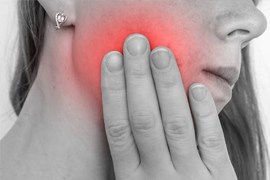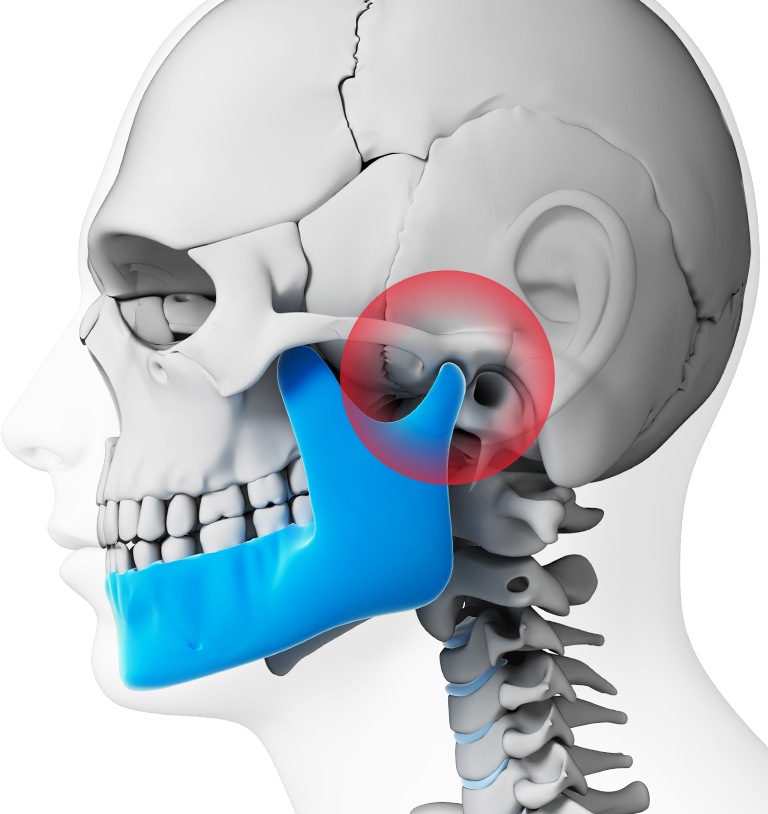SERVICES
TMJ Therapy
The temporomandibular joint (TMJ) connects your jaw to your skull, and can sometimes become a source of pain or discomfort known as TMJ disorder (TMD). This common syndrome is suffered by millions, and can be caused by injury to the teeth or jaw, misalignment of the teeth or jaw, teeth grinding, poor posture, stress, arthritis, and gum chewing. When the balance of these jaw bones, cartilage, and muscles is lost, this can result in headaches, earaches, difficulty in opening and closing the jaw, a clicking or popping in the joint, a dull aching pain around the ear that spreads into the face, and sore or painful jaw muscles.
Although TMD is not life-threatening, at 7Dental we understand how its symptoms can become chronic and difficult to manage, and therefore may be detrimental to quality of life. Our dentists will provide a range of techniques to reduce pain, prevent tooth damage, and will develop a treatment plan to correct your bite alignment if necessary.
Bruxism
Teeth grinding, also known as bruxism, is associated with TMJ disorder and stress, and can cause a range of problems for your oral health. Many people grind their teeth in their sleep, which overtime can lead to the thinning of enamel, chipped teeth, as well as bone and muscle problems. Crowns, bridges, or other dental restorations can restore your bite and eliminate the pattern of grinding and clenching.
Stress is a major cause of teeth grinding and clenching. In a small percentage of cases, sleep patterns are responsible. The reasons children grind remain unclear.
When you grind your teeth, you can wear away tooth enamel. This can lead to sensitive teeth and tooth decay, and it can also cause damage to expensive dental work. Finally, grinding taxes the muscles and joints of the temporomandibular (jaw). Prolonged grinding may damage the jaw joint enough to cause osteoarthritis as well as bone loss.
Teeth-grinding is thought to be hereditary. It’s also related to gender: three times as many women as men grind their teeth. Bruxism is most common in those between 20 and 40 years of age. Ironically, the regular grinder may do less harm than the intermittent grinder–sort of like the weekend athlete who’s not in shape for intense activity. The regular grinder can wear down teeth, but his or her muscles get stronger from the habit.
Clenching may do more harm than grinding because although your jaw is designed for chewing, it is not designed for clenching. As a result, clenching can cause degeneration in the joint. People who grind are usually aware of their habit. They wake up with a stiff or tired jaw, or their spouse hears the noise during the night. Clenchers, on the other hand, may be ignorant of their problem. Some people clench all day and don’t realize it, although they do find that their jaw pain increases throughout the day.
Some of the symptoms of bruxism:
- A sore, tired jaw
- Difficulty in opening and closing
- Sensitive teeth
- And earaches or pain in one or both of your jaw joints.
If left untreated, you may experience the following symptoms:
- Flattened or worn-down teeth
- Teeth chipped at the gum line
- Loose teeth
- Damage to the bone around your teeth
- Or damage to your jaw joint
Spaces, worn teeth, or teeth that are out of alignment may cause grinding and clenching. Crowns, bridges, or other dental restorations can restore your bite and eliminate the pattern of grinding and clenching.

One of the most common and effective ways to stop the damage caused by teeth grinding and clenching is the use of a nightguard. Following an assessment by our dentists, our clinic will have a custom night guard made for you, and can prevent the damage and pain caused by TMJ and teeth grinding. Jaw pain is preventable and treatable in many cases; you no longer have to suffer in silence! Please speak with our dental providers at your next appointment if you would like to learn more about TMJ disorder, or if you are experiencing any of these symptoms.
Tips For Teeth-Grinders
It is important to let your dentist know about any teeth grinding habits.


Your 7Dental professional may suggest one or more of the following :
Your dentist at 7Dental can make a plastic or acrylic appliance for you to wear at night. Although it may not stop you from grinding, it will redistribute the forces from grinding and protect your teeth from damage. Your dentist will want to see you regularly to check for any tooth movement or cavities that might result from wearing such an appliance. Keep in mind, however, that in order for the night guard to do any good, you must remember to put it in.
Your teeth should be touching only when you’re chewing or swallowing. Drop your jaw and feel the muscles relax — then try to maintain that feeling.
The warmth of the water may temporarily relax your jaw muscles. The warmth of the water may temporarily relax your jaw muscles
A walk or other mild exercise may help relieve some of the tension and stress that’s causing bruxism.
If you’re a daytime clencher, think of ways to remind yourself not to clench. For example, you can put a red dot on your phone, stickers on your wristwatch, or even a string on your finger to remind you to keep your jaw relaxed.
Stress is a major contributor to grinding, so if you can reduce stress, you will likely reduce grinding.
Practice stress-reducing techniques such as progressive relaxation, guided imagery or self hypnosis. Listen to playlists for relaxation. See a psychologist or psychiatrist if possible. It is important for your overall mental health and well-being to take good care of yourself, and find ways to manage stress.
Ibuprofen, for example, can dull the pain and help relax stiff muscles.
Warm, moist heat is best. Soak a washcloth in hot water, wring it out, and hold it up to your jaw. You can also use a heating pad, although moist heat will better soothe the area.
Massages work to relax the rest of your body, so try a gentle massage to your jaw muscles.
Limit steak, hard-crusted bread, popcorn, gum, and other chewy foods that give your jaw a workout, especially when jaw discomfort is at its worst.
Common Teeth Symptoms of TMD:
- Teeth Symptoms
- Clenching or grinding teeth
- Inconsistent tooth pain (relocates)Pain when swallowing, speaking or chewing
Common Jaw Symptoms of TMD:
- Popping, clicking and grating noises
- Tenderness or pain in the jaw joint
- Difficulty opening or closing mouth
- Jaw “locks” or “sticks”
- Difficulty yawning, chewing and opening wide
Common Neck Symptoms of TMD:
- Neck pain/stiffness
- Tired or sore muscles
- Muscle spasms
- Lack of mobility
- Shoulder and backache
Common Head Symptoms of TMD:
- Headaches
- Sinus/migraine
- Forehead/temples
- Pressure in sinuses
- Face aches
- Pain behind eyes
- Facial muscle spasm
This cycle of TMJ pain, spasms, and joint imbalance can be triggered by:
- Clenching or grinding the teeth
- A bad bite caused by missing teeth
- Badly aligned teeth
- A blow to the joint
- Arthritis
- Emotional stress
Clenching and grinding will often go away once a person’s stress is reduced, breaking the cycle of TMJ syndrome. In the meantime, there are other ways to break this cycle. You can reduce muscle spasms and pain with moist heat, inflammation-reducing drugs, and muscle relaxants, muscle massage, and a soft diet.
To restore balance to the joint, we may crown (cap) teeth, fill spaces, adjust the bite, or even move teeth. A splint, which is a plastic mouthpiece, can reduce clenching and grinding and help restore harmony to the joint.
Millions of people suffer from TMJ syndrome. At 7Dental we believe that the right treatment plan and simple lifestyle changes can break the TMJ cycle and restore harmony to the joint.

Abfraction
When your bite is slightly off, it’s common that one tooth may hit sooner than the rest. This causes undue stress on the involved teeth and they begin to flex. It is this continual flexing and stress, over time, that causes the enamel to separate from the inner dentin layer, forming a notch in your teeth characteristics of abfraction.

There are two possible steps involved in solving the abfraction. We may first adjust your bite so that chewing forces are evenly distributed among all your teeth. The second phase involves restoring the damage by bonding a filling in place. White, natural looking fillings can fill the damage and restore the tooth to nearly its original color and shape.


NTI Appliance
It’s estimated that at least one-fourth of Canada’s population suffers from debilitating tension headaches, migraine pain, or painful problems associated with their jaw joint. And while a variety of lifestyle and health issues can complicate these problems, recent research has shown that intense, prolonged jaw clenching is the predominant factor in the perpetuation of these symptoms.
When muscles have been constantly contracting, they become tense and sore. Clenching keeps the muscles involved in opening and closing your jaw in a constant state of tension and varying degrees of pain, and can strain your sinuses and cause your neck to feel stiff.
Fortunately, we now have a simple device that can significantly reduce jaw clenching intensity and the painful problems it causes. The NTI Tension Suppression System works by preventing the contact between the molar and canine teeth. Without this contact, your jaw cannot clench intensely, and muscles will not become fatigued. The NTI is a small acrylic appliance that’s customized at 7Dental to precisely fit your bite. It’s worn securely over your upper front teeth while you sleep, or at other times when you find yourself clenching.
In just one appointment at 7Dental, we can create your NTI appliance. First, we try the appliance on, and precisely customize its fit by lining it with a malleable plastic material. Once the customized portion has hardened, we carefully make any final adjustments and polish it.
The NTI Tension Suppression System is an easy and effective tool your team of professionals at 7Dental utilize to treat headaches and jaw pain without medication or extended therapy. Please speak to your dentist as your next appointment if you’d like to learn more!


